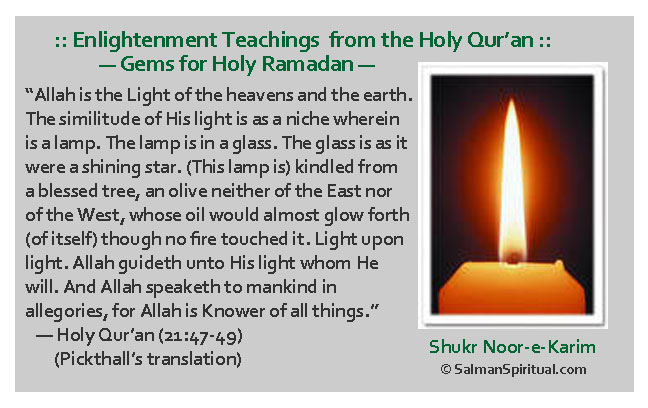

"He it is Who sendeth down clear revelations unto His slave, that He may bring you forth from darkness unto light; and lo! for you, Allah is Full of Pity, Merciful." — Holy Qur'an 57:9
:: Trait No. 11: Dimensions of the Inner Knowledge ::
Friday,
Dec. 5, 2025
Bismillahir Rahmanir Rahim
In the name of Allah, the Most Beneficent, the Most Merciful.
Ya Ali Madad and Ramadan Mubarak. This post consists of five parts
Part 1: Enlightenment Teachings from the Holy Qu'ran

Part 2: Excerpts from 'A Code of Conduct—A Treatise of the Etiquette of the Fatimid Ismaili Mission'
In 'al-Risāla al-mūjaza al-kāfiya fī of Ahmad b.Ibrāhīm al-Naysbūrī has written the following gem:
"[§17] Inner knowledge breaks down into many parts."
"[§18] Among them is sensate knowledge, which involves comprehension of the lower hierarchy and of legal actions, their interpretation and the wisdom in it, and understanding everything that pertains to acts that can be seen or perceived by a person."
"[§19] A second is cognitive and imagined knowledge, which involves the knowledge of higher hierarchy and the numbers, and the comprehension of ideal forms whose reality cannot be seen or sensed by the senses, but only appreciated in thoughts and imagination."
"[§20] Then there is intellected knowledge, which comprises the understanding of things as they truly are, knowledge of causes, and their beginnings and endings."
"[§21] These are three stages, the first is like mother's milk for the infant. It is for the novice, like sensory knowledge in the process of his instruction. The second resembles his becoming educated and associated with imagination, and the knowledge articulated to him. The third is like attachment to him of intellect upon the acquisition of which he attains his majority, and he becomes responsible for what he does in respect of his having attained legal maturity which is not subject thereafter to change and alteration."
"[§22] That which only sensed is apprehended by the five senses; that which is imagined is apprehended by thoughts; and that which is intellected is abstract reality itself. A person who apprehends something by the senses moves up to thoughts and he thinks about it until he moves up to intellectual comprehension, by which he judges between truth and falsehood and comes to know its reality in the science of religion. They say that sensed knowledge is the science of law; the imagined is the science of interpretation; and the intellected is the true explanation that never changes. Each one has many branches and a variety of openings for interpretation. "
(Source: Klemm, V. and Walker, P. E., A Code of Conduct—A Treatise of the Etiquette of the Fatimid Ismaili Mission, pp.43-44)
Part 3: Dhikr Tasbi
We believe that through of Noor of Mowlana Hazar Imam, the Noor of Imamat, and through the Noor of Mowlana Murtaza Ali (a.s.), we will come close to He who is above all else.
Let us now recite the dhikr of Ya Ali, Tuhi Tu with humility, courage and conviction:
Bismillahir Rahmanir Rahim
In the name of Allah, the Most Beneficent, the Most Merciful
Ya Ali, Tuhi tu: O Ali, Only You are You
Al-hamdu lillahi rabbil 'alamin.
Praise be to Allah, the Lord of the worlds!
Part 4. Angelic Salwat
Let us recite angelic salwats to invoke Divine grace and mercy.
Bismillahir Rahmanir Rahim
In the name of Allah, the Most Beneficent, the Most Merciful
Allâhumâ salli alâ Muhammadin wa âle Muhammad:
O Allah! Bestow Peace on and through Muhammad and his Descendants
or
Al-hamdu lillahi rabbil 'alamin.
Praise be to Allah, the Lord of the worlds!
Part 5. Ardent Global Prayers
O Noor Mowlana Hazar Imam: bless the global Jamat with spiritual and luminous tayid (help) to advance materially, spiritually and intellectually; and create sunshine in our hearts and bless all of us with the inner vision of the Truth.
Haizinda — Qayampaya
(Our Present Imam is Living and His NOOR is Eternal)
Traits of an Ismaili Dai